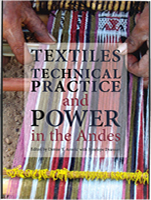Textiles, Technical Practice and Power in the Andes
:Textiles, Technical Practice and Power in the Andes

Autores:
edited by Denise Y. Arnold and Penelope Dransart
Editores:
London and New York: Archetype Publications, 2014.
Paginación:
351 páginas
Peso:
Formato:
ISBN:
: 978-1-909492-08-8
Palabras claves:
Textiles, Andes su-centrales, textile technique, textile practice, power relations, gender relations, tocapu, peinecillo, weaving instruments, Inkas, woven iconography, Recuay, Chancay, Qeros, ayllus, Macha, Qaqachaka..
Costo:
45 GBP, 115 USD plus postage.
Disponibilidad:
Si.
This book examines the importance of textiles in in Andean societies, past and present, as vital indicators of regional ideas about technique and technology, and the ways these interact with power relations, including gender and class relations. The focus is on Andean textiles from a weaver’s point of view, as living things which express through their structures and techniques a complex three-dimensional worldview. The chapters examine the various tasks and processes in the productive chain of textile making, and the manifold ways in which the ideas about a finished textile product refer back continually to these ontological experiences shared by Andean societies. Through different thematic approaches, the book explores the ways that the material existence of textiles served, and still serves, as a record of technological knowledge, at the heart of human-centred efforts to coordinate and integrate diverse populations into socio-cultural and productive endeavours in common, in difficult environmental circumstances. Chapters on the avid technical competitions between young weavers, communicative systems based on differential forms of spin and twist, the technical features of weavings as evidence of cultural origins, or as expressions of identity and alterity, and textile organisation (on a par with khipus) as documents about agricultural resource use and allocation, all illustrate the interests of societies which privilege technical creativity and complexity, and its visual and textural expression. Contributions cover time periods from the Early Horizon to contemporary rural communities of weaving practice, mainly in the South Central Andes.
Nexo: http://www.archetype.co.uk/publication-details.php?id=199
Fax: La Paz (00 591 2) 2 419661 - Correo Electrónico: ilcanet@ilcanet.org

